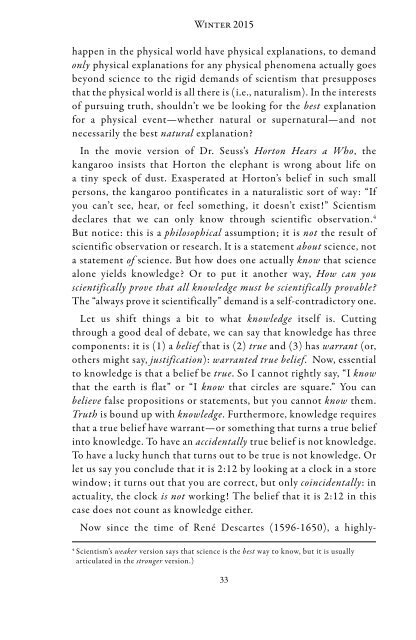THE CITY
h6c7p5d
h6c7p5d
Create successful ePaper yourself
Turn your PDF publications into a flip-book with our unique Google optimized e-Paper software.
Winter 2015<br />
happen in the physical world have physical explanations, to demand<br />
only physical explanations for any physical phenomena actually goes<br />
beyond science to the rigid demands of scientism that presupposes<br />
that the physical world is all there is (i.e., naturalism). In the interests<br />
of pursuing truth, shouldn’t we be looking for the best explanation<br />
for a physical event—whether natural or supernatural—and not<br />
necessarily the best natural explanation?<br />
In the movie version of Dr. Seuss’s Horton Hears a Who, the<br />
kangaroo insists that Horton the elephant is wrong about life on<br />
a tiny speck of dust. Exasperated at Horton’s belief in such small<br />
persons, the kangaroo pontificates in a naturalistic sort of way: “If<br />
you can’t see, hear, or feel something, it doesn’t exist!” Scientism<br />
declares that we can only know through scientific observation. 4<br />
But notice: this is a philosophical assumption; it is not the result of<br />
scientific observation or research. It is a statement about science, not<br />
a statement of science. But how does one actually know that science<br />
alone yields knowledge? Or to put it another way, How can you<br />
scientifically prove that all knowledge must be scientifically provable?<br />
The “always prove it scientifically” demand is a self-contradictory one.<br />
Let us shift things a bit to what knowledge itself is. Cutting<br />
through a good deal of debate, we can say that knowledge has three<br />
components: it is (1) a belief that is (2) true and (3) has warrant (or,<br />
others might say, justification): warranted true belief. Now, essential<br />
to knowledge is that a belief be true. So I cannot rightly say, “I know<br />
that the earth is flat” or “I know that circles are square.” You can<br />
believe false propositions or statements, but you cannot know them.<br />
Truth is bound up with knowledge. Furthermore, knowledge requires<br />
that a true belief have warrant—or something that turns a true belief<br />
into knowledge. To have an accidentally true belief is not knowledge.<br />
To have a lucky hunch that turns out to be true is not knowledge. Or<br />
let us say you conclude that it is 2:12 by looking at a clock in a store<br />
window; it turns out that you are correct, but only coincidentally: in<br />
actuality, the clock is not working! The belief that it is 2:12 in this<br />
case does not count as knowledge either.<br />
Now since the time of René Descartes (1596-1650), a highly-<br />
4<br />
Scientism’s weaker version says that science is the best way to know, but it is usually<br />
articulated in the stronger version.)<br />
33


